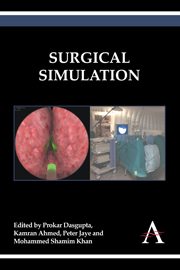Book contents
- Frontmatter
- Contents
- 1 Surgical Simulation: An Overview
- 2 Simulation in Historical Perspective: The History of Medical and Surgical Simulation
- 3 The Role of Animal Models in Surgical Training and Assessment
- 4 Full Procedural Surgical Simulation
- 5 Developing Non-technical Skills
- 6 Learning Curves for Simulators
- 7 Developing a Simulation Programme
- 8 Patient Safety and Simulation
- 9 Psychometrics
- 10 Future of Surgical Simulation
- Author Details
9 - Psychometrics
Published online by Cambridge University Press: 05 April 2014
- Frontmatter
- Contents
- 1 Surgical Simulation: An Overview
- 2 Simulation in Historical Perspective: The History of Medical and Surgical Simulation
- 3 The Role of Animal Models in Surgical Training and Assessment
- 4 Full Procedural Surgical Simulation
- 5 Developing Non-technical Skills
- 6 Learning Curves for Simulators
- 7 Developing a Simulation Programme
- 8 Patient Safety and Simulation
- 9 Psychometrics
- 10 Future of Surgical Simulation
- Author Details
Summary
Chapter Objectives
This chapter will enable the reader to:
• Recognise definitions of the psychometric properties of simulation-based training;
• Analyse the psychometric properties of simulation-based assessment in differentiating trainees' performances;
• Understand how to measure the reliability of an assessment process.
Five Key Messages
There are a wide variety of assessment tools used to assess surgeons using simulation which can collectively provide evidence of both technical and non- technical capabilities.
Simulation can provide robust evidence of the level of surgical performance which is reliable and valid.
Psychometric analyses can be used to reliably identify those trainees who need targeted support and those who can be fast tracked through training.
There is emerging evidence of the validity and reliability of simulators to provide robust feedback on surgical performance.
The use of psychometric analyses can identify how an assessment method can be enhanced.
Introduction
The advent of new surgical techniques has brought new challenges for education and training as well as for the assessment and revalidation of surgeons (1–3). These challenges must be set against the backdrop of changing patterns of service delivery, the implementation of evidence-based practice and the increasing expectations of the public in relation to professional evidence and the accountability of competence (4). For the surgical specialties, the reduction in training time and postgraduate specialty training recommendations have halved the surgical case-load that trainees are exposed to (5).
- Type
- Chapter
- Information
- Surgical Simulation , pp. 95 - 110Publisher: Anthem PressPrint publication year: 2014



